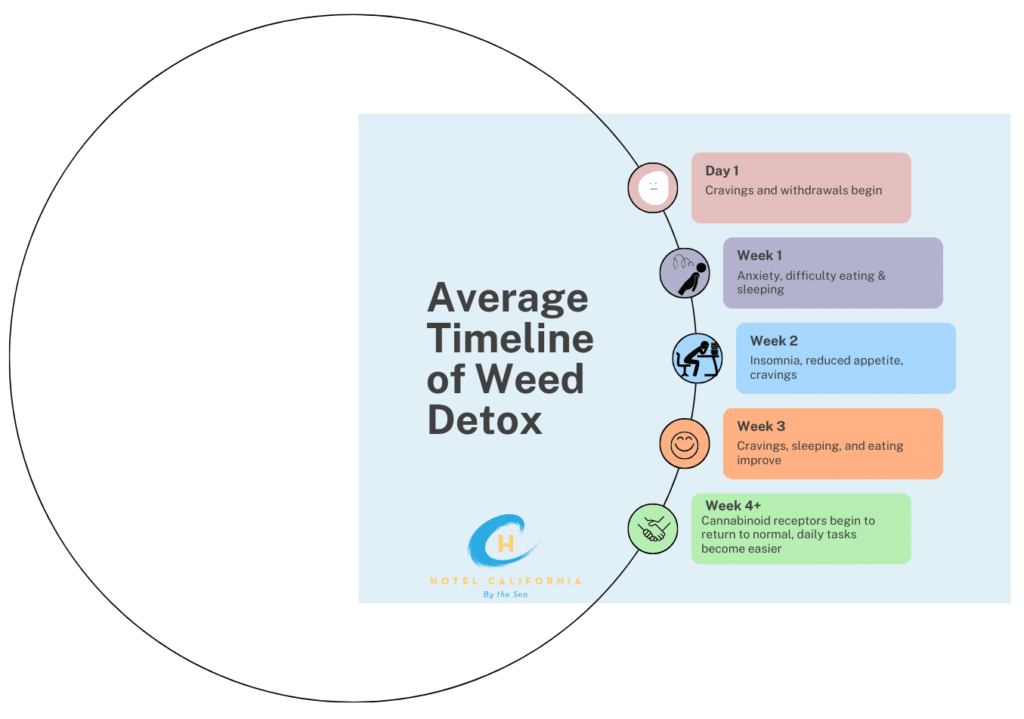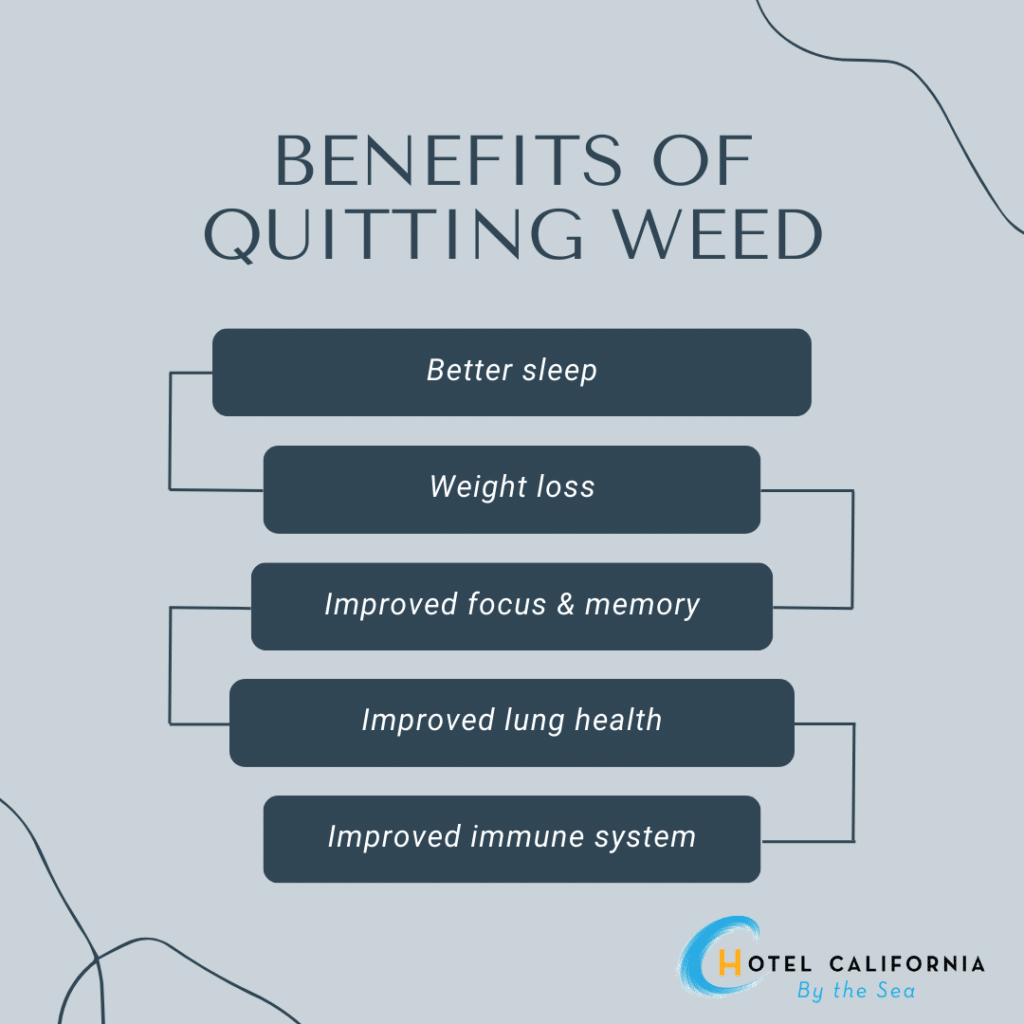What are the Benefits of quitting Weed?
Marijuana. Cannabis. Weed. This psychotropic substance is one of the most commonly abused mind-altering drugs among young people ages 18-25. According to a 2021 report from the National Survey on Drug Use and Health, an estimated 11 million young adults reported using marijuana. With long-term use, weed can begin to cause severe psychological and physical damage to the brain. It can easily become an addictive substance. The National Institute on Drug Abuse reports an estimated 30% of people who consume marijuana develop an addiction. What happens when you quit marijuana? What are the benefits of quitting weed?

Marijuana derives from the leaves, flowers, stems and seeds of the cannabis plant. It contains chemical compounds called tetrahydrocannabinol (THC) and cannabidiol (CBD), along with over 480 other compounds. THC and CBD are the most popular. When ingesting THC or CBD, users can experience both mental and physical effects such as a sense of euphoria, an altered state of mind and a warped sense of time and space.

Effects of Marijuana
The Schedule I drug has a high potential for abuse. The drug over-stimulates a part of the brain that contains the highest number of receptors that naturally react to THC-like chemicals. Many people and young adults often use weed to self-medicate and help temporarily reduce anxiety and pain.
Short-term side effects include an altered sense of time, changes in mood and behavior, impaired body movements, difficulty thinking and problem-solving, impaired memory, hallucinations, delusions and psychosis. In more severe cases of substance abuse, marijuana can cause damage to brain development. This is especially prevalent in young people. It can impair cognitive thinking and disrupt learning functions leading to lasting damage into adulthood.
Marijuana is usually smoked and inhaled through hand-rolled joints, blunts, pipes and bongs. It can be ingested orally through edibles, which are cannabis extracts that have been mixed or infused into foods. Some people also inhale oil concentrates through vape pens known as dabbing.

The benefits of quitting Weed
- Improved respiratory health. According to the American Lung Association, marijuana smoke contains the same amount of toxins, irritants and carcinogens as tobacco smoke. Tobacco smoke is a known contributor to lung cancer, chronic bronchitis and other respiratory issues. This means cannabis smoke can produce the same effects. Smoking these toxins can also lead to pulmonary fibrosis, a condition that creates scars in the lungs making the user prone to infections and exposure to bacteria. When quitting weed and all forms of marijuana, scars will begin to heal and breathing will begin to improve. Smoking weed has a significant impact on the health of the lungs. When a user stops, it can improve overall respiratory functions, improve lung capacity, clear lungs of mucus buildup and even reverse some signs of lung damage.
- Improve cognitive function and mental clarity. Smoking weed affects the part of the brain that is responsible for learning, memory, concentration and decision-making. Oftentimes, marijuana can leave the user experiencing brain fog. A study from the Massachusetts General Hospital revealed that young people who stopped smoking weed were better able to process and retain new information compared to those who continued to smoke. Marijuana smoking cessation can improve long and short-term memory function through healing of the hippocampus part of the brain. Users will also find improvements in the prefrontal cortex, which is responsible for concentration, attention span and decision-making. Overall cognitive abilities improve and can heal when a user quits weed.
- Improvement in cardiovascular health. Smoking marijuana increases heart rate putting strain on the cardiovascular system. When quitting, it can normalize blood pressure, and blood flow and decrease swelling in the heart, allowing it to function more normally.
- Improved mental health. Marijuana is a psychoactive drug that can result in feelings of anxiety and paranoia. This is ironic because users often smoke the drug in an attempt to control their mental health issues. Cannabis use exacerbates mental health conditions such as anxiety and depression because THC activates the body’s stress response. This is especially prevalent in cases of marijuana abuse and addiction. THC can also affect mood regulation. Research has found that when marijuana use has stopped, users experience reduced levels of psychological distress, less and anxiety and depression, and an overall ability to regulate feelings.
- Improvement in sleep. Some people use cannabis to help them sleep. However, chronic cannabis use is known to contribute to disrupted sleep and poor sleep quality. THC can disrupt the body’s natural sleep cycle causing issues of insomnia and staying asleep. When quitting cannabis, users will see an improvement in their sleep and develop a healthier sleep routine. This also contributes to improvements in anxiety and depression.
- Other benefits of quitting weed include improved skin health and weight management. Smoking anything in general is harmful to the skin. It causes premature wrinkles and fine lines. Quitting weed can help users look younger and skin stay healthier. One side effect of smoking weed is an increase in appetite as well as increased sedation. This often leads to unhealthy eating habits including eating junk food and binge eating, while doing less physical activity. Users who quit marijuana can experience weight loss, fewer food cravings, improved eating habits and spending less money on drugs and unhealthy snacks.
Check Your Insurance Coverage for FREE
Find out if your insurance covers addiction treatment in minutes. We accept most insurance!
How to cope with quitting Marijuana
Cutting down or quitting any drug is not easy. In extreme or severe cases, a behavioral health treatment program can be the most beneficial. However, many people who use marijuana, are able to quit without entering a full-on treatment center. Compared to other illicit substances such as heroin or cocaine, symptoms of marijuana use are much milder. There are a few ways to help cope with the stresses of quitting marijuana.
- Staying physically active is a great way to naturally increase endorphins and serotonin in the body to boost mood.
- Picking up a new hobby can help keep the mind occupied and focused on something productive.
- Getting involved with the community and volunteering time to help others can also help boost morale and mood.
- Staying on top of your nutritional and mental health keeps you motivated to stay drug-free. Eating healthy and practicing meditation and yoga can help heal the brain and fuel the body.
- Setting meaningful goals can also keep you motivated and decrease mental health conditions such as anxiety and depression.
- Staying away from people, places and environments that are triggering or associated with your drug use can help maintain sobriety.
- Seeks out professional medical treatment to help you stay sober.
- Seek out the support of family, friends, or addiction support groups to help keep you accountable and know that you are not struggling alone.
Reach out to Hotel California by the Sea
We specialize in treating addiction and other co-occurring disorders, such as PTSD. Our Admissions specialists are available to walk you through the best options for treating your addiction.
Treatment for Marijuana Use Disorder
Weed can become an addictive substance and when it does, the user can develop marijuana use disorder. Its psychiatric and mind-altering properties can affect both the physical and psychological health of a user. Hotel California by the Sea provides substance use disorder treatment programs for drugs such as marijuana. Our detox, residential and outpatient programs are customized to the needs of individual clients. There is no one-size-fits-all when it comes to addiction treatment.
We provide evidence-supported treatments such as CBT, DBT and marriage and family counseling. We specialize in treating co-occurring mental health conditions that often present alongside a substance addiction. When this happens, it is important to treat both conditions simultaneously and as part of a holistic approach. Hotel California by the Sea provides clients with the necessary tools and support they need to overcome their addiction and live a healthier life in recovery.
References:
https://www.addictioncenter.com/drugs/marijuana/treatment/
https://www.helpguide.org/articles/addictions/overcoming-drug-addiction.htm
https://www.simcoerehab.ca/2022/12/09/the-benefits-of-quitting-weed/
https://www.genesisrecovery.com/benefits-of-quitting-marijuana/
https://nida.nih.gov/publications/drugfacts/cannabis-marijuana
https://www.usdrugtestcenters.com/drug-test-blog/327/6-benefits-of-quitting-marijuana.html
https://www.ncbi.nlm.nih.gov/pmc/articles/PMC5607644/
